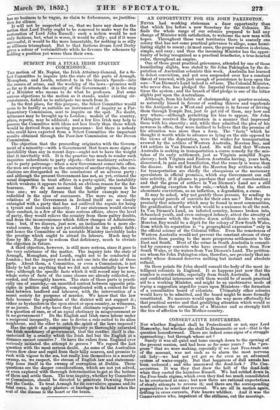SUBJECT FOR A FINAL IRISH INQUIRY COMMISSION.
THE motion of Mr. Napier, the Irish Attoiney-General, for a Se- lect Committee to inquire into the state of the parts of Armagh, Monaghan, and Louth, referred to in the Queen's Speech—into the causes of crime, and the working of the laws—promises well so far as it attests the sincerity of the Government : it is the step of a Minister who means to do what he professes. But some serious objections to the motion as it stands, under existing cir- cumstances, forbid us to anticipate too much from it. In the first place, for this purpose the Select Committee would seem to be hardly so suitable an instrument of inquiry as a Par- liamentary Commission sent to inquire on the spot. No doubt, wituesses may be brought up to London; models of the country, plans, reports, may be adduced; and a few live Irish may help to possess the Committee with ideas not less lively than those which would be derived from a moving panorama : but there is nobody who could have expected from a Select Committee the important results obtained through the Poor-law Commission or the Devon Commission.
The objection that the proceeding originates with the Govern- ment of a minority—with a Government that bears more signs of instability than any in recent days—ought not to have the weight that it inevitably will. It is the practice too much to render such inquiries subordinate to party objects—their machinery subservi- ent to party patronage : when a new Government comes into office, the men are swept away as the creatures of another regime, the con- clusions are disregarded as the conclusions of an adverse party; and although the present Government has not, as yet, evinced the usual disposition to treat affairs in a party-spirit, the instability which weakens it appears to furnish an obvious reason for the for- bearance. We do not assume that the paltry reason is the true one; we only foresee that the better example may be enfeebled in the eyes of successors. The more so, since the relations of the Government in Ireland itself are so closely entangled with a party that has not outlived the repute for being a tyrant and insolent minority. If our statesmen would elevate their conduct, in a few of the more serious affairs, above the level of party, they would relieve the country from these paltry doubts, and from the inconveniences which follow changes of Administra- tion: but, if we discern, just now, an inclination to a more ele- vated course, the rule is not yet established in the public faith ; and hence the Committee of an unstable Ministry inevitably lacks the prestige which ought to attend its labours. Much may be done by Mr. Napier to redeem that deficiency, much to obviate the objection in future. I third objection, however, is still more serious, since it goes to the very substance of the matter. The inquiry into the state of Armagh, Monaghan, and Louth, ought not to be conducted in London; but the inquiry needed is not one into the state of those parts. About them, a Committee, or even a Commission, is not likely to tell us anything that we did not substantially know be- fore ; although the specific facts which it will record may be new, whole series of facts of the same classes are already collected, re- corded, and thoroughly known. The state of those parts is practi- cally one of anarchy,—an unsettled contest between opposite prin- ciples in politics and religion, complicated with a contest for the land between landlord and labourer, with the intervention of a secret society for purposes of murder. We know that the law fails because the population of the district will not support it ; either as bystanders in the open street or open country, as witnesses, or as jurors. But why have they that obstinate repugnance ? Is it a question of race, or of an equal obstinacy in misgovernment or in no-government ? Do the English and Irish races labour under a reciprocal incapacity, the one to devise a rule suited to its alien neighbour, and the other to catch the spirit of the laws imposed ? Has the spirit of a conquering tyranny so thoroughly saturated the Irish machinery of government, that the routine itself is cha- racterized by a cruelty which the Irish feel but the English at a distance cannot conceive ? Or have the riders from England ever seriously initiated the attempt to govern We regard the last question with the most serious doubt. As some of the Australian rivers flow clear and rapid from their hilly sources, and promise to rush with vigour to the sea, but really lose themselves in a marshy swamp, so, we suspect, the stream of English law and statesman- ship loses itself in the swamp of corruption at Dublin. These questions are the deeper considerations, which are not yet solved, or even explored with thorough determination to get at the bottom of them and settle them. The true inquiry, whether by Committee or Commission, should be directed to penetrate Downing Street and the Castle. To treat Armagh for its convulsive spasms and its fatal sores, is to apply plasters or bandages to the hand when the seat of the disease is the heart or the brain.


























 Previous page
Previous page